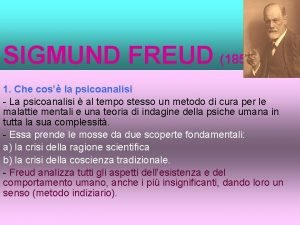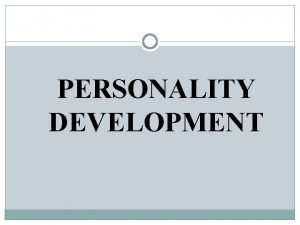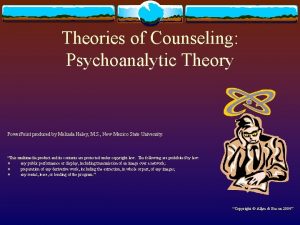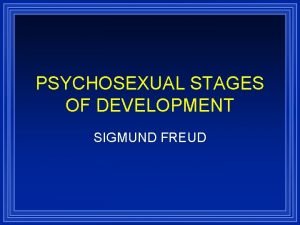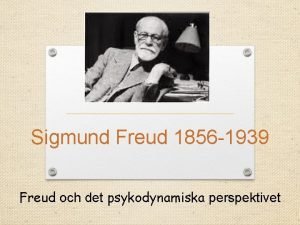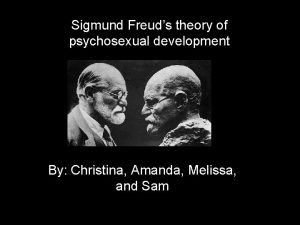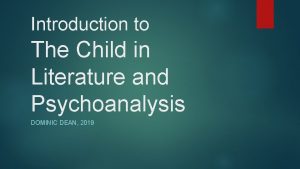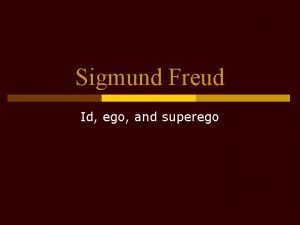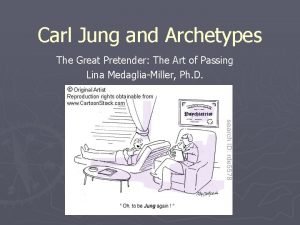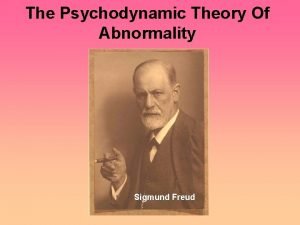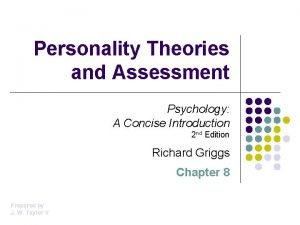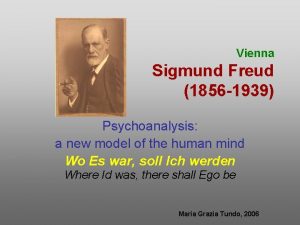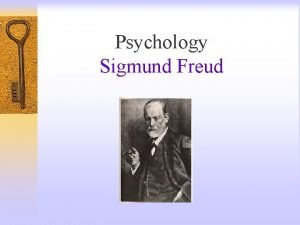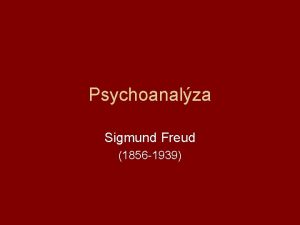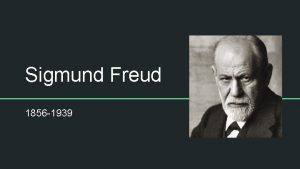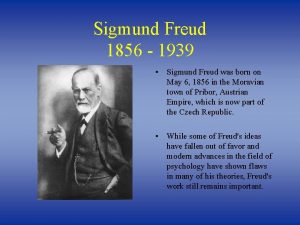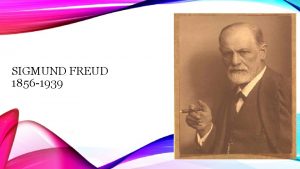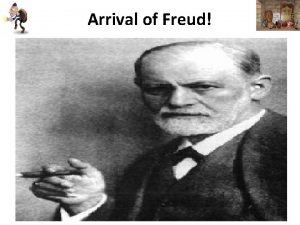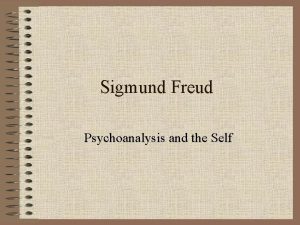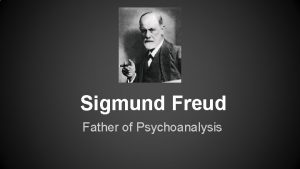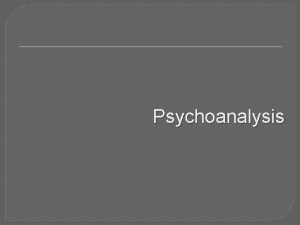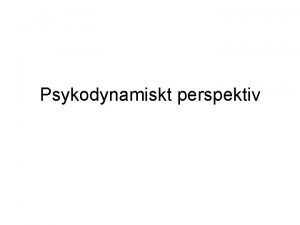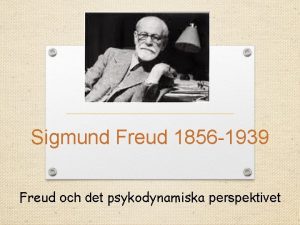Vienna Sigmund Freud 1856 1939 Psychoanalysis a new
















- Slides: 16

Vienna Sigmund Freud (1856 -1939) Psychoanalysis: a new model of the human mind Wo Es war, soll Ich werden Where Id was, there shall Ego be Maria Grazia Tundo, 2006

Dynamic psychology • Working with Breuer, a Viennese colleague and friend, he developed the idea that many NEUROSES had their origin in unresolved conflicts, in deeply TRAUMATIC EXPERIENCES, now FORGOTTEN and HIDDEN from consciousness. • Childhood sexual experiences are crucial. • Treatment: to enable patients to recall the experience to consciousness, to confront it in a deep way, thus discharging it.

Human personality • Psychic energy= human personality is an ENERGY SYSTEM. • Principle of the conservation of energy by Helmholz= the total amount of energy in any given physical system is always constant; when energy is moved from one part of the system it must reappear in another part.

The theory of the unconscious • We are governed by hidden mental processes of which we are unaware and over which we have no control. • Whenever a psychic urge or drive is repressed, suppressed or driven out of consciousness it appears elsewhere. • The ID, the EGO, the SUPEREGO interact dynamically (a topographical tripartite model of the mind). • Wit, dreams, so-called Freudian slips and free associations are analytic tools. • Aim: to permit freedom through knowledge, even if Freud revealed how limited knowledge is.

Theory of the drives • Libido = sexual energy. • Sexuality = any form of pleasure derived from the body. • Eros (the life instinct)= all self-preserving and erotic instincts. • Thanatos (the death instinct) = all instincts towards aggression, self-destruction, and cruelty - (annihilation of the self).


A topographical model of the mind • The ID is that part of the mind in which there are the instinctual sexual drives which require satisfaction. • The SUPER-EGO is that part which contains sociallyacquired control mechanisms which have been internalised. • The EGO is the conscious self created by the dynamic tensions and interactions between the id and the super-ego. • The task of the EGO is to reconcile the conflicting demands of the id and the super-ego with the requirements of external reality. • Psychological well-being: a harmonious relationship between the three elements


Stages of development • ORAL STAGE (infants derive pleasure through the act of sucking). • ANAL STAGE (the locus of pleasure or energy release is the anus, particularly in the act of defecation) • PHALLIC STAGE (the young child develops an interest in its sexual organs as a site of pleasure and develops a deep sexual attraction for the parent of the opposite sex, and a hatred of the parent of the same sex (the 'Oedipus complex'). This, however, gives rise to (socially derived) feelings of guilt in the child and to “castration anxiety”. • LATENCY PERIOD (at five, the child usually resolves the conflict of the Oedipus complex by coming to identify with the parent of the same sex).

Defence mechanisms • They attempt to prevent conflicts from becoming too acute. • REPRESSION (pushing conflicts back into the unconscious) • SUBLIMATION (channelling the sexual drives into the achievement of socially acceptable goals) • FIXATION (the failure to progress beyond one of the developmental stages) • REGRESSION (a return to the behaviour characteristic of one of the stages)

Psychoanalysis as Therapy • The talking cure. • Patients had to relax (use of the couch; analyst out of sight). • Method of free-association (to disarm the super-ego). • Analysis of dreams (manifest and latent content). • Help the patient to overcome resistances and hostility towards the analyst. • Aim: the patient must become conscious of unresolved conflicts buried in the unconscious mind. • A form of self-understanding. It is up to the patient to decide how to handle this newly-acquired understanding of the unconscious forces motivating him.

Transference • Transference is a phenomenon characterized by unconscious redirection of feelings for one person to another. • One definition of transference is "the inappropriate repetition in the present of a relationship that was important in a person's childhood • Transference occurs when a client projects feelings toward therapist that more legitimately belong with certain important others. • Freud felt that transference was necessary in therapy in order to bring the repressed emotions that have been plaguing the client for so long, to the surface.


Freud's famous couch

Freudianism and literature • Freud’s theories provide various means of investigating human culture and its artefacts, including literature. [. . . ] • Freud's work on the language and structure of dreams, which emphasizes that all human thought and discourse is fundamentally symbolic, has produced fruitful comparisons between dreams and poetic language. • Both rely upon metaphor, simile, and synecdoche to say one thing in terms of another.

 Sigmund freud 1856 até 1939
Sigmund freud 1856 até 1939 Sigmund freud psychoanalytic theory
Sigmund freud psychoanalytic theory Freudian iceberg
Freudian iceberg Psychoanalysis
Psychoanalysis Phallic stage definition
Phallic stage definition Sigmund freud teoria
Sigmund freud teoria Freuds utvecklingsteori
Freuds utvecklingsteori Genital stage clipart
Genital stage clipart Freud background
Freud background Psychosexual theory
Psychosexual theory Sigmund freud family tree
Sigmund freud family tree Sigmund freud clark university
Sigmund freud clark university Sigmund freud id and ego
Sigmund freud id and ego Jung animus
Jung animus Sigmund freud psychodynamic approach
Sigmund freud psychodynamic approach Freud's theory of personality
Freud's theory of personality El ello el yo y el superyo explicacion
El ello el yo y el superyo explicacion
